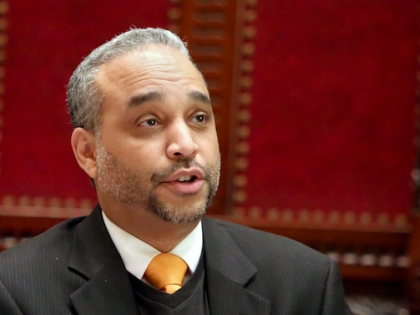
Report: New City Law and AG Settlement Agreements Spur Improved Translation, Language Access Services in NY Chain Pharmacies
Jose Peralta
December 15, 2010
-
ISSUE:
- Consumer Protection
Recommends Passage of Statewide Legislation to Expand Gains in Consumer Safety and Fill Gaps
A new report released today by a coalition of consumer advocates finds that a recent city law and statewide Attorney General settlement agreements have led to significant improvements in the way chain pharmacies in New York provide language access services to limited English proficient (LEP) customers. The coalition, led by Make the Road New York (MRNY) and New York Lawyers for the Public Interest (NYLPI), lobbied for the city to pass the law last year and are now joining with State Assembly Member Richard Gottfried (D-Manhattan), chair of the Assembly’s Health Committee, as well as Senator José Peralta (D-Queens) in calling for the state legislature to pass similar legislation that would be effective all across New York.
This legislation addresses a crucial public health and consumer safety issue: At present, ninety million Americans have trouble understanding instructions on prescription labels, putting them at risk for incorrect use. Unknowing addiction, adverse drug reactions and inability to adhere to medication treatments are only some of the dangerous potential hazards associated with the lack of easily accessible prescription drug instructions. This legislation comes on the heels of the state Attorney General investigating and reaching settlements with several major pharmacy chains statewide for failure to provide adequate language assistance services, as well as the passage of a city law to provide translation and interpretation services for LEP consumers.
This past summer, MRNY and NYLPI surveyed over 250 chain pharmacies across the state of New York —including Rite Aid, Duane Reade, K Mart, CVS, Pathmark, Target and Walgreens—to determine the extent to which pharmacies were complying with the city law and Attorney General settlement agreements. Chain pharmacies not bound by local law or the settlement agreements were surveyed to determine whether additional regulation actually improves access to services for patients.
The report, entitled Prescription for Safety: Establishing Standards for Clear and Accessible Prescription Medication, shows that the settlement agreements and the city law have led to some improvement in LEP consumers’ ability to understand the medications they receive. However, there is not yet full compliance, and consumers’ health and safety are still being put at risk. Almost 50% of pharmacies surveyed were unable to state that they met the prescription label translation requirements of the laws; almost 30% of surveyed pharmacies could not state that they provided mandated interpretation services for medication counseling. Further, pharmacies not subject to the additional regulations and laws are still providing very poor access to LEP consumers. Most significantly, the findings show that many consumers—regardless of the language they speak—continue to have a difficult time understanding the instructions and labels that accompany their medication, and there is little in existing law to help guide them.
“We have a clear and all-too-present danger to consumers identified in this report,” said State Senator Jose Peralta, chair of the Senate Consumer Protection Committee. “Taking prescription medications shouldn’t be a game of Russian Roulette for seniors, non-English speakers or anyone else. I am committed to doing all I can, working with my colleagues in the legislature, to make medication instructions and prescription labels understandable to all consumers.”